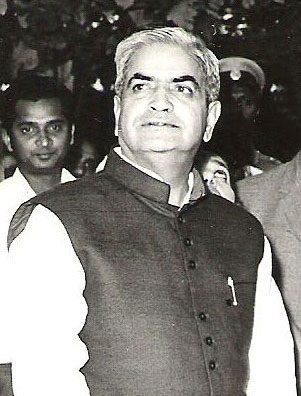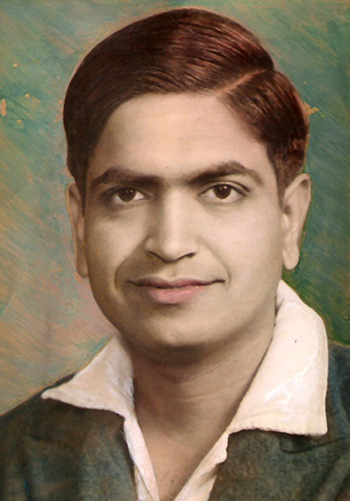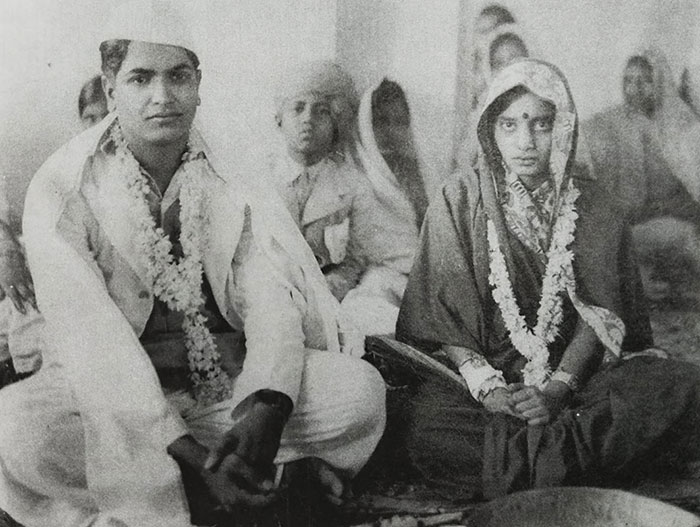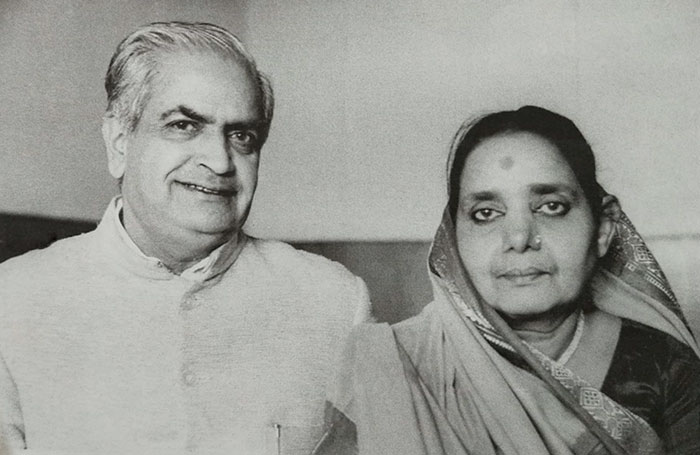Jeevan Yatra - Nathdwara to Jaipur

Creator of modern Rajasthan, Mohanlal Sukadia was born in Nathadwara in 1916, on the day of Shravani Amavasya (31st July). Shravani Amavasya has great significance in the life of the people of Rajasthan. It is also called the Hariyali Amavasya. It is a pleasant coincidence that on the day of the Hariyali Amavasya, the boy was born who then had paved the way for the prosperity and pleasant future of the entire region by constructing modern Rajasthan.
Shri Sukhadia's father, Shri Purusashtamdas Sukadia was the distinguished cricketer of Bombay and Saurashtra. Mr. Goverdhanlal Ji Maharaj, the Tilkayat of the Srinath Ji temple at Nathdwara, had invited Shri Purushantam Das, to teach cricket to his son, Damodarlal. After the death of his first wife, Shri Purusthtamdas had second marriage in Nathdwara. In Nathdwara, they had two Childs. A boy named Mohanlal Sukadia and girl named Mani.
Shri Sukhadia was inspired by his father to adopt the virtues of discipline and economy. His father was an absolute devotee of Mahatma Gandhi. They regularly read newspapers and talk to their friends about the freedom movement that is going on in the country in those days. Mr. Sukhadia's child mind started recording the virtues of politics and country service since then.
Shri Sukhadia also got a legacy from his father in playing cricket. He was made the captain of the school cricket team due to his skill in the game. From that, he developed the qualities of disciplined team spirit and leadership. He also developed the art of singular, soulful and mesmerising speech during the same period. He prepared for the school debates competitions and won the prizes.
Study in Bombay

After getting elementary education at Nathdwara and Udaipur, Shri Sukhadia moved to Bombay to get technical education. From there he received a diploma in Electrical Engineering. He was a student at the Victoria Institute (VJTI) Bombay. Because of his acumen and leadership qualities, he was elected general secretary of the Students ' Council of the Institute. At a function of the Institute, the British Principal Mr. Barley wanted to call the British governor of the then Bombay State, but Mr. Sukhadia opposed it with all his colleagues. He urged that Mr. B. G. Kher Chief Minister of the then responsible government of the Bombay State should be invited for the ceremony. Given the solidarity of the students, their insistence was finally accepted. This was the first movement of Mr. Sukhadia against the English government in which he succeeded.
While studying in Bombay, he came in touch with national leaders like Shri Subhash Chandra Bose, Sardar Vallabhbhai Patel, Shri Yusuf Meher ali and Shri Ashok Mehta. In those days, Mr. Sukhadia used to attend the meetings of congress party held by Sardar Patel in Bombay.
When he returned to Udaipur, he opened a store of electrical goods to earn livelihood. Some of his old colleagues say that externally, it was a shop, but it was, in fact, the centre of Mr. Sukadia's political activities where his companions would gather and discuss the measures to liberate the Mewar from the imperial and the British slavery of the country. He and his companions also had the task of social reform and propagation with political activities. He was introduced to the family of Indubala, as a teacher and he started teaching Indubala Ji.
Marriage to Indubala Ji
Mr. Sukhadia's marriage to Indubala was a revolutionary event at that time. It was not possible for him to get married in Nathdwara or Udaipur due to the tremendous social opposition. So they considered it safe to go to the Beawar town of Ajmer-Merwara area, ruled by the English government. The marriage ceremony was held on 1st June, 1938 from the Arya Samaj mode of marriage. After the marriage, when the bride and the brides came to Nathdwara, the young companions of the country welcomed them with a spirit of gaiety and enthusiasm. How much of this marriage was in the struggle for their future life, it is manifested by their own works that they had revealed to one of their admirers a few days before their death.
 His admirer asked Shri Sukhadia what was the best moment in his long-term public life? The reply of Shri Sukhadia was that when he entered into a procession in his hometown of Nathdwara, surrounded by social activitist with Smt. On that day, the young men, with the slogan of 'Mohan Bhaiya Zindabad', shouted with joy and gaiety into a procession in the entire city. In the words of Mr. Sukhadia himself, "I have never had such a grand and unfulfilled procession as Chief minister. The procession inspired me to move forward in the struggle for future life. There was a phenomenal crowd of youngsters around me. I did not look back after this incident."
His admirer asked Shri Sukhadia what was the best moment in his long-term public life? The reply of Shri Sukhadia was that when he entered into a procession in his hometown of Nathdwara, surrounded by social activitist with Smt. On that day, the young men, with the slogan of 'Mohan Bhaiya Zindabad', shouted with joy and gaiety into a procession in the entire city. In the words of Mr. Sukhadia himself, "I have never had such a grand and unfulfilled procession as Chief minister. The procession inspired me to move forward in the struggle for future life. There was a phenomenal crowd of youngsters around me. I did not look back after this incident."
Smt Indubala turns out to be a lucky charm for the family. His motherly kindness and compassion were not confined to the family alone, but all the political workers, the Workers and the visitors to their house, she was very hospitable to them as a proud mother. Shri Sukhadia was always a political activist and later the Minister of State of Mewar and the CM of Rajasthan. Therefore, providing hospitality to the family members and all visitors was the responsibility of Smt. Indubala Sukhadia ji. Popularly known as ' Zia ', Mrs. Indubala Sukadia was enshrined as a humble mother in the people of the entire state.

An exclusive devotee of India's eminent astrologer, Padma Vibhushan Pandit Shri Suryanarayan Vyas, had said over the years that his father had once visited Ujjain at the infancy of Indubala and that he wanted to know the future of his girl from Pandit Suryanarayan ji. Pandit Ji saw the birth chart of Indu Bala and said that this girl would one day beautify the Queen of the Majestic and glorious King of a large kingdom.
Indubalaji gave birth to two sons and five daughters. She was an exclusive devotee of Durga Mata.. When Mr. Sukhadia served as a political activist, it was natural for Indu ji to do all the work from cooking and washing the house. But, after Mr. Sukhadia became the chief minister of Rajasthan, for 17 years, she herself took care of the in the chief minister's home Kitchen and was working to make food for all.